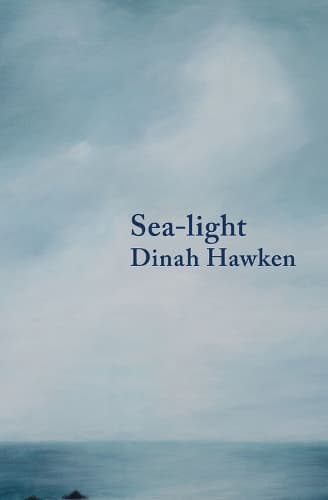Review: Sea-light
Reviewed by Paula Green
He is bending forward into his own thinking
as if it is a small pool at the edge
of a wild and scenic river.
from Sticks and stones
I fell in love with the poetry of Dinah Hawken in the 1990s, and have been in love with it ever since. Reading her deftly crafted poems is akin to standing in an outside clearing and reconnecting with sky, earth, water, trees, birds, stones. It is personal, it can be political, and it is people rich. These vital themes and the trademark luminous writing are present in her latest collection, Sea-light.
In Sea-light, the poetry digs deeper into existence, linking girl to woman, life and death, peace ahead of war, the power of silence and the power of the spoken. The opening poem, Train of thought, is a perfect threshold into the collection. You board the poem as you board the train of thinking, feeling the rhythm, looking out the windows, peering between the lines, absorbing the conversation, how things change.
Some poems in the collection have affected me more than any individual poems in a long time. Sticks and stones is a moving, fable-like pacifist poem. So original, so potent, so thought-provoking. A small woman returning in a blue urn, equally moving, is a tribute to a sister who has passed. Grief at the persistence of war and guns becomes grief at the loss of a loved one.
Take her, my nephew said,
as if it was urgent.
So I did. I held her.
I held the urgency
and the urn.
The third poem that affected me so deeply is Body talk, where breast cancer is the subject, where the girl with a terror memory still inhabits the much older woman who faces a biopsy needle.
Once, playing girls versus boys on a hillside,
I was held down and out like a star
by four big boys in whom something cruel
had begun to turn and sometimes,
from somewhere, a pocket knife appears,
is opened slowly, and glints.
The book’s epigraph is a fitting guide to reading the collection. The epigraph is presented as a found poem, with just a few words changed, and is taken from an essay Dinah read in the Guardian Weekly:
Perhaps peace means creating
so compelling a story of possibility and wellbeing
that people wander out of their bunkers,
put down their weapons and come over.
Rebecca Solnit
We could replace “poetry” for “story,” because these poems demonstrate so astonishingly what poems can do. Poetry can deliver wellbeing, whether we read or write it: in the ideas, feelings, connections, and in the challenges. It is what holds me in poetry’s continued grip, heightening the degree to which I think and feel something.
The sea, as the title might suggest, is a recurrent presence, a constant in the life of a poet who lives near the water with its mystery, its movement and its mood. Yet coupled with multiple views of the ocean - a way of holding the collection under the mesmerising reach of sea-light - is the subterranean and equally vital current of love. Dinah’s poetry is both imbued in love and is a consequence of love, whether a love of words, people held dear, or our endangered planet.
Sea-light showcases a poet roving in order to reflect back, to contemplate the moment, to wonder forward. Her lyrical and mental agility coupled with such keen observation, such measured and original steps, is like a holding a wondrous snow globe as you read. This book fills me with wonder. Sea-light is Dinah Hawken at her very best.
Reviewed by Paula Green
